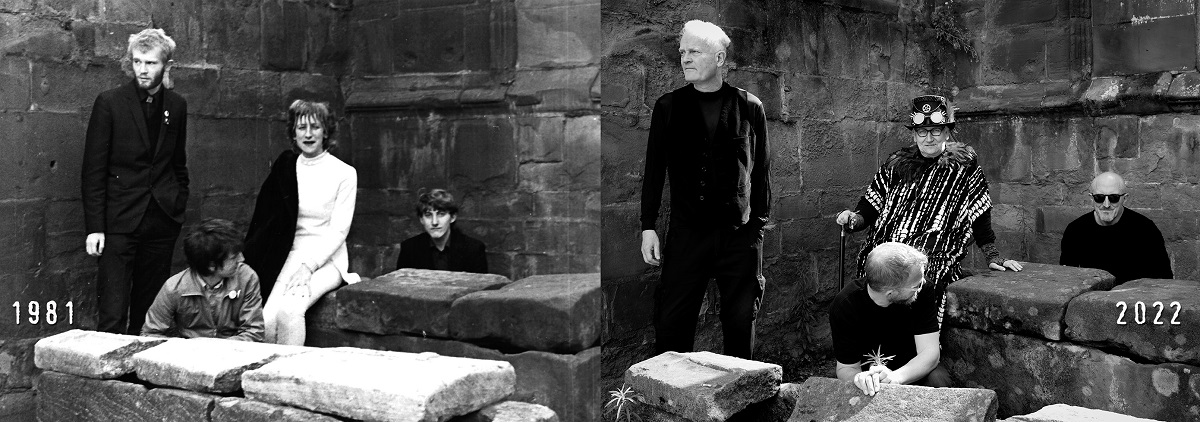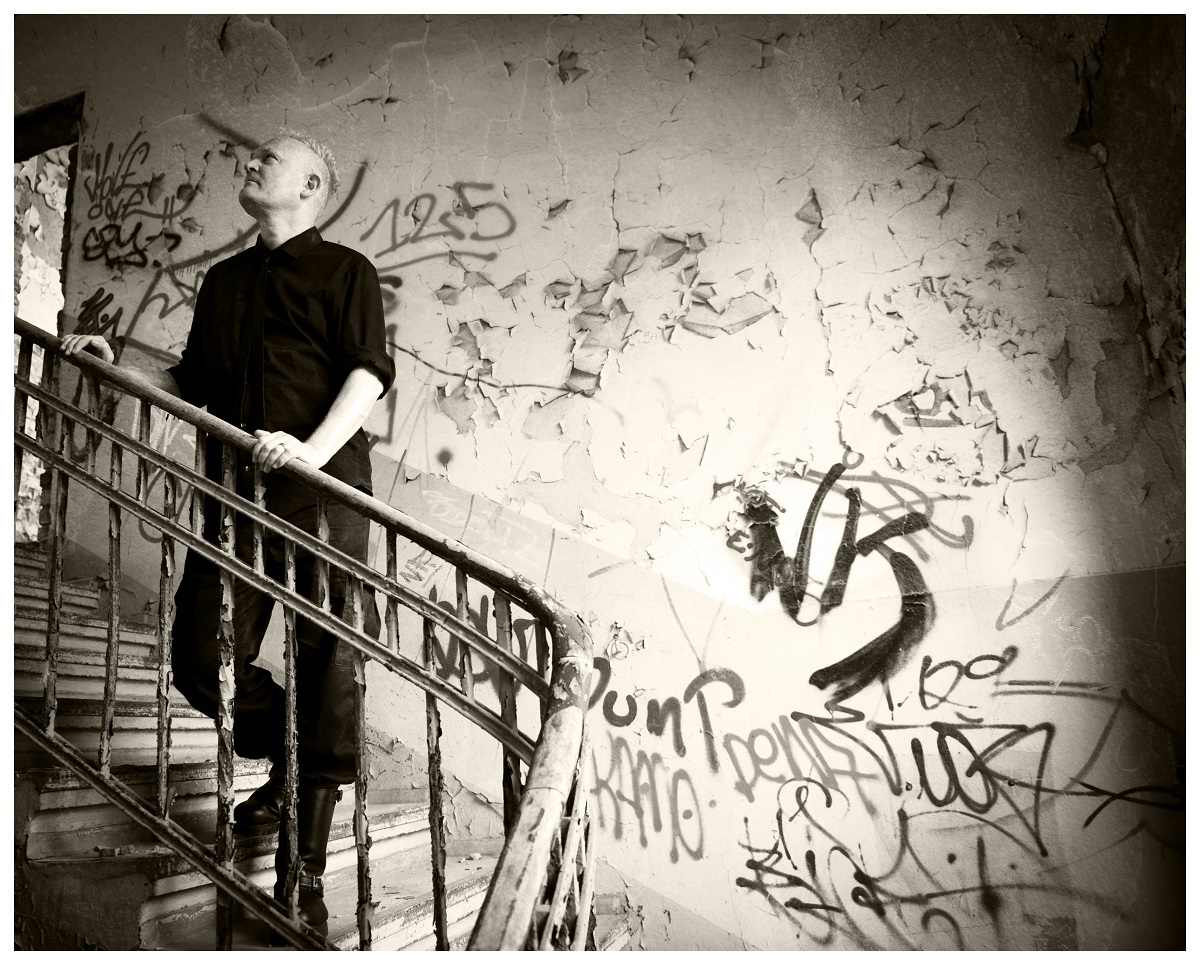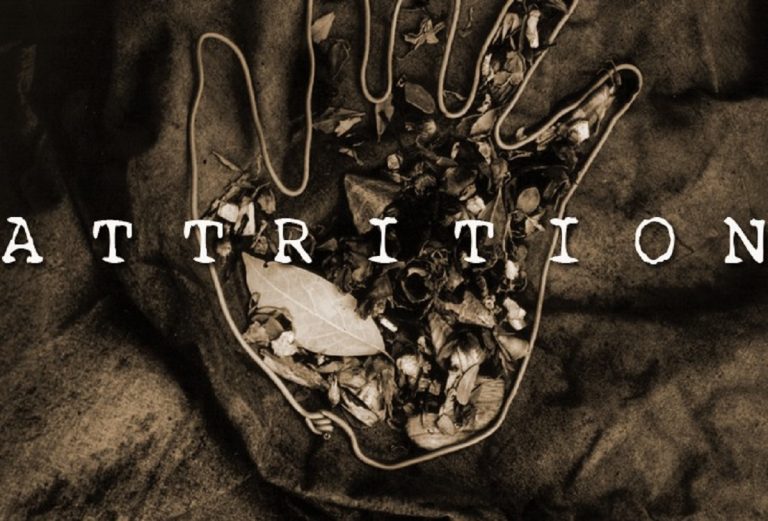Born in 1980 from the burgeoning post-punk scene, Coventry’s Attrition have carved out a unique musical niche for themselves and, still powered by the do-it-yourself ethos, have sustained a lengthy career with little help from the mainstream media. In a conurbation more known for 2-Tone and ska, Attrition have been shining their black light to expose the city’s dark underside. With a new album (The Black Maria) just released and their original ‘80s line-up back together for the first time in 30 years, the band are rejuvenated and ready to take on the world. Peter Dennis spoke to the band (Martin Bowes, siblings Ashley and Julia Niblock, and John Waller) just prior to the homecoming gig at The Arches venue.
You were originally involved in the D.I.Y. punk scene. Do you think that has helped Attrition exist for well over four decades?
Martin: I think so. In the early ‘80s we were always photocopying flyers and sending out cassettes, there was a whole underground network, we used to put soap on the stamps so when they got franked you could wash them off and use them again.
Julia: It doesn’t work now with the barcode.
Martin: Then we got signed to a label and although I used to do all the promotion myself, occasionally I’d leave all that sort of stuff to the label, but it was never as good as when I’d do it myself and I found it too impersonal. But after the physical sales collapsed around the millennium, everyone thought the music industry was over, but then it all returned with the vinyl, cassette and fanzine revivals. I like the hands on feel, so I think that punk era was good training.
Do you think things have come full circle?
Martin: In a some ways, obviously it has changed as well. People were doing everything online, but now I think they want a physical experience. You can spend every hour promoting and contacting people, because it’s easier to find people now.
Is it easier now? There are so many bands vying for attention on the internet, can you get lost in the melee?
Martin: It’s easier in a way, but there’s so much data, we’re kind of overloaded, aren’t we?
Ashley: I think it is harder to stand out, but if you made the effort before, then now you are part of the global community.
Martin: There were also people like John Peel who would act to filter out the noise, and who you would trust, but that’s not quite the same now. When independent music came along with punk it was great, you could release a record without being signed to a major, but it also led to this data overload. But you’d never get someone truly original like David Bowie signed to a major, they only do the bland stuff.
Black Sabbath say they were influenced by their industrial surrounds, I wonder if Coventry’s brutalism has a similar influence on Attrition?
Julia: I think it was more remote for me. There was a thriving music scene and I used to go to a lot of gigs with Martin, and I remember taping a lot of music from John Peel’s show.
Martin: Coventry is an industrial city, but I wished we’d been in Sheffield at the time, we might have done better. Here was all 2-Tone, and nobody wanted to listen to Attrition in Coventry. But it’s unique; it’s an old medieval city in its core, it was originally more like York, so it hasn’t got big industrial buildings in the city, it was more lighter industry, small workshops and the car plants were closing down, so it was quite depressed.
Ashley: I think it was far enough from other musical centres to have its own identity, that’s why 2-Tone is quite interesting; it’s a Midlands phenomenon and was due to immigration and people from other places settling here which was fantastic and a big influence.
Martin: People say that Coventry isn’t very friendly and that’s because we had so many immigrants in the 1960s, including my family who came from up north, that people didn’t know each other but that led to things like 2-Tone. My girlfriend moved here from London and she says it’s really friendly because everyone’s got to know each other. I don’t know if that’s relevant to Attrition, but it’s the background.
Ashley: I think it is because it had an identity here that’s not London, Liverpool or Manchester, and because of its location and history it did have a chance to have something, and 2-Tone was the thing. It had a vibrant music scene, my big sister [Julia] was going out to shows and I though it was brilliant, I was exposed to all that great music. I think it was its location and the way it grew independently.
Martin: Musically, I think it is not so much the industry, but more the concrete and the depressive atmosphere, which was true for most of the UK. It had an influence on a lot of music, and it definitely had an influence on us.
Ashley: I do agree with you, there was definitely an element of post-war, concrete jungle playing into Attrition.
Martin: Although none of us lived in that environment, we were more from the suburbs.

Pre-internet, did you feel isolated playing this style of music?
Martin: In 1982-3 when we were playing more electronic, experimental stuff, there was the rise of what Sounds termed “Wild Planet”, there was kind of a scene but everyone was a bit different, and we didn’t know anyone in Coventry playing that kind of stuff, I did feel like everything was happening in London, or in Europe even. So when we did the first album and toured with The Legendary Pink Dots, we relocated because it didn’t feel as if Coventry had anything for us. Back then you didn’t have the internet and we were isolated and that’s why we moved to London, it seemed like there was more happening, but it was more Europe that was into our music.
Ashley: We did have something, but it was a thing we made for ourselves, we had our own little studio set-up.
Now the classic 1981 line-up is back together. How did that come about?
Ashley: A combination of circumstances really, but we were the original line-up.
Martin: Originally, my brother Chris was playing guitar, but he was rubbish so we kicked him out!
Ashley: But before that I was playing drums, but I only played the bedroom gigs, Julia played bass, and that carried on for a while.
Martin: Originally, Me, Ashley and his friend Woody did something called The Death House Recordings which was improvised, but we released it under the name Attrition. So, in 2020 Ashley said let’s do a “Death House 2” because we’ve never done it live, so we performed it three times in Coventry…
Ashley: It was weird because that very first recording was in my bedroom studio, then Martin heard it and added some bits on his four-track, then Woody did some stuff too, and that became the first Attrition album. Fast forward forty years and Martin said we had a gig but we didn’t have a singer, so Martin said why don’t we just to Death House? So, I was just waiting for the right moment to ask Julia to sing, and we performed together for the first time again at Infest in 2022 for the first time in 30 years.
Martin: There was the other guy Simon, whose not with us now, and Woody plays with us occasionally when Ashley can’t make it. And John [Waller] played with us in the mid-1990s, and he’d roadie for us in the ‘80s, so he’s family to us.
How did it feel playing together after all those years? Some people say you should never go back in life.
Ashley: It depends on the circumstances. Julia and I are blood…
Martin: We’re mostly performing the new songs, which I think is good. I look at the first album and it’s great, but we’re not trying to recreate that era. I think if we were to go back to the original songs, if we were to do a set of just those, it’d be weird. I like the fact that we’re mostly doing newer stuff, and we’ll do more new stuff together.
Ashley: The stuff that Martin writes today is amazing.
Martin: Ashley used to write the basslines, so when I started to write them, I used to think what would Ash do? He used to put little bends in it and now that’s what I always do.
Ashley: The stuff you write is exemplary. I remember listening to Martin’s songs a year ago and telling him it was amazing, the way the bass twists and bends, and he said yes, I learned it from you! What catalysed a lot of this stuff was our dear mum’s funeral. I had not stood next to Julia singing for a number of years, but at mum’s funeral I held it together really well until Julia and I stood next to each other singing, and I have to tell you, it brought me to tears.
Although we had Covid, it’s been a long gap (nine years) between studio albums. Was that intentional and do you think that’s a good thing?
Martin: It wasn’t intentional, it was largely down to circumstance. I actually think it’s a good thing, there seems to be more interest because it’s been awhile. I think most bands slow down naturally as they progress, and it’s taken me a lot of work just keeping the back catalogue going, there’s so much remastering to do for reissues; Dante’s Kitchen is being reissued on vinyl, so there’s all the work around that. When I write the lyrics, they’re very personal and for this album they just wouldn’t click, and when my partner [Kerri Bowes] died in 2022, it was like the end of a chapter and they fell into place. But I had side projects, and I do mastering and mixing in my studio [The Cage], so there was lots of things, but I definitely think it’ll be quicker for the next one.
It’s sounds like you had a hard time losing Kerri. Did that play into the album’s aesthetic?
Martin: Well, ‘The Alibi’ starts with a wedding theme, so…and we’ll be playing it tonight for the first time. The first time I got divorced I wrote ‘A Girl Called Harmony’ which is probably the most famous Attrition song, so I suppose something good always comes out of bad.
I wonder how easy or difficult is it to make Martin’s words and music come to life when you’re on stage?
Julia: I bounce off them, Martin will come up with a demo and I’ll listen and listen to it and then work stuff around it and we just seem to bounce off each other. Some of them were already recorded, ‘The Great Derailer’, Emke from Black Nail Cabaret originally sang on that, so you just have to take it and make it your own.
Ashley: The key is to have that combination between Martin and Julia; they have this amazing contrast and amazing understanding, and the music just seems to flow from that.
John: I think that’s unique to Attrition. I can’t think of anyone whose playing this style.
Ashley: The interplay between Martin and Julia is the backbone of everything, and out of that, both write interesting music. I find in interesting how Martin has evolved within the framework of no formal training.
Martin: I have art training though, so I see songs more than hear them when I’m composing, that’s why I like soundtracks. Also, there’s harmonies in visuals and I’m always fascinated about that; a colour has a frequency, so in a way a colour could be a harmony for audio, it’s just that we use a different receptors to catch them.

You all radiate a positive demeanour, so what is it like inhabiting these dark songs on stage?
Martin: I don’t really think of them as dark, I can’t write any other way. They’re not happy, but they’re not particularly sad. There’s a lot of dark humour in there as well. I feel comfortable in that zone, that’s my place.
Ashley: I’m fascinated by the whole spectrum of experience; it’s good to feel happy and positive, but what do you do with the rest of that? I don’t think it’s very far away, a feeling of melancholy or bittersweetness.
Martin: Someone once described our music as “The exploration of darkness as a beautiful place”, and that’s true of life in general. I like Joy Division and it cheers me up actually, especially if I’m feeling down. I love horror films and I feel that people are facing fears by watching them. There is a certain darkness to our sound…but it’s quite sexy as well!
Ashley: It’s inevitable, I think, and anyone with curiosity is fascinated by the dark side of life and I think having a lens onto that, something that people can relate to is healthy. I’m not sure if it’s a conscious thing, but it occurs and we explore it.
Martin: The dark side of life is going down the meat isle in Sainsbury’s for me as a vegan, but people do it with a smile on their face.
John: It’s weird that it is characterised that way, but darkness can be great and useful. Some of the things we’re into outside music are astronomy and bats, and those things thrive in darkness.
As you mentioned, tonight will be the first airing of ‘The Alibi’ live. How do you feel about that?
Martin: It’s always a bit scary doing a new one, but it worked out pretty well in rehearsal. You gradually get used to them, but it’s always a bit scary, but exciting.
Now the album has been out in the world, how do you feel about it?
Martin: I’m pleased, it’s had amazing responses…but still nobody knows who we are!
You produced the album. How easy is it editing your own work and acting impartially towards it?
Martin: I like doing it. You don’t need to be impartial, I think you just need to love it and work on it. Sometimes I’ll be working on a song, think it’s not working then scrap it and just keep one bit. I always feel as if there’s a soul to a piece of music, and if you can’t find it then it is not there. I don’t want to be distant from it, I want to live it.
But how do you know when something is finished?
Martin: It’s difficult, I sort of generally know. But you could always tinker; every song that Attrition’s ever done could be reworked, but I think there comes a certain point where you have to let it go and move on to the next thing.
Finally, what are your future plans, do you envision this line-up being together from now on?
Martin: Yes, I don’t see any reason not to. We’ve done an ambient track for a local gallery exhibition and I like the idea of doing a limited edition ambient EP, and that could follow up pretty quickly.
Ashley: I do feel like we have a renewed opportunity and excitement to do something special, and I’m super excited for what we are going to do in the future.
Martin: it won’t be long until another album.
Interview by Peter Dennis
Martin Bowes photo by Holger Karas


